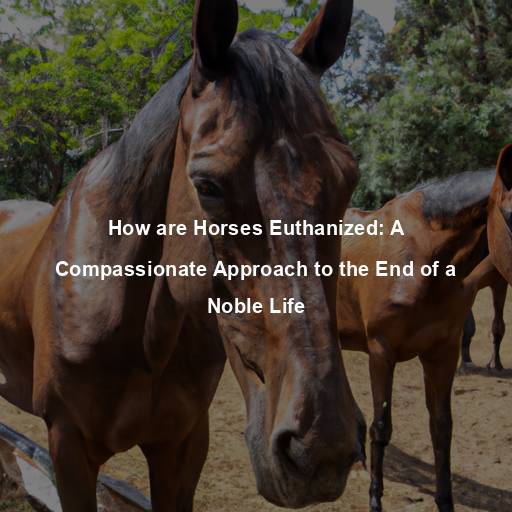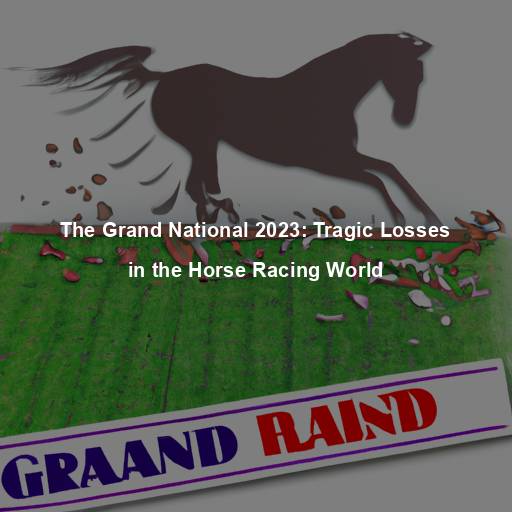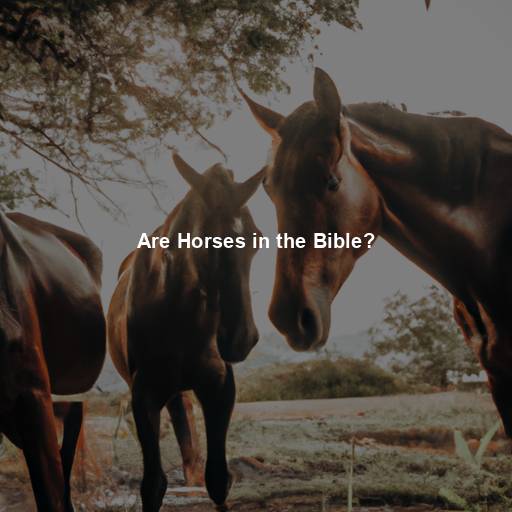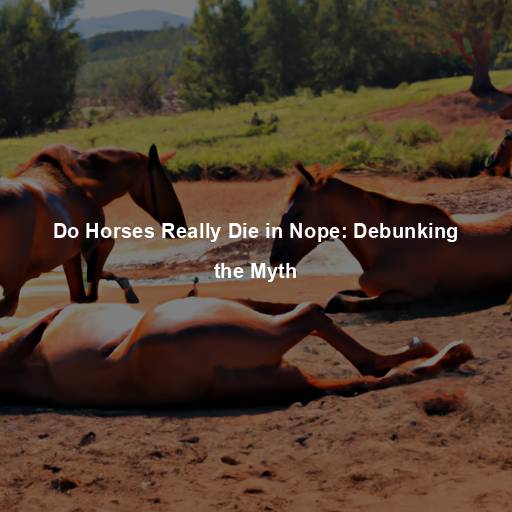How are Horses Euthanized: A Compassionate Approach to the End of a Noble Life
Last Updated on October 20, 2023 by Evan
Contents
- 1 Understanding the Emotional and Ethical Dimensions of Euthanizing Horses
- 1.1 The Sensitive Nature of Euthanizing Horses
- 1.2 The Importance of Considering Quality of Life
- 1.3 Method #1: Intravenous Injection
- 1.4 Method #2: Gunshot
- 1.5 Method #3: Chemical Restraint
- 1.6 Method #4: Carbon Dioxide
- 1.7 The Role of Veterinary Professionals
- 1.8 Coping with Grief and Loss
- 1.9 The Importance of Advanced Planning
- 1.10 Addressing Financial Considerations
- 1.11 The Aftermath: Handling the Body
- 1.12 Communicating with Children and Other Animals
- 1.13 Ethical Considerations and Controversies
- 1.14 Seeking Emotional Support
- 1.15 The Legacy of Our Equine Companions
- 2 Embracing Compassion and Empathy in Difficult Decisions
- 3 FAQs – How are horses euthanized?
Understanding the Emotional and Ethical Dimensions of Euthanizing Horses
The Sensitive Nature of Euthanizing Horses
The decision to euthanize a beloved horse is undoubtedly one of the most heart-wrenching choices any horse owner may face. It is a deeply emotional and ethically complex decision that requires careful consideration of the horse’s quality of life, suffering, and overall well-being. In this article, we will explore the various methods and approaches used to euthanize horses, focusing on the most humane and compassionate practices. By shedding light on this topic, we hope to provide guidance and support to those who find themselves grappling with this difficult decision.
The Importance of Considering Quality of Life
Understanding the intricate nuances surrounding euthanasia is imperative when it comes to considering the well-being of our equine companions. One crucial aspect that warrants thorough consideration is a horse’s quality of life. This encompasses a multidimensional evaluation, including physical health, mental disposition, and the aptitude to engage in innate behaviors. Once a horse’s quality of life reaches a disheartening state, plagued by ceaseless pain, unrelenting suffering, and the inability to relish basic activities, euthanasia emerges as a contemplative and compassionate choice to forestall their prolonged distress.
Method #1: Intravenous Injection
When it comes to euthanizing horses, many veterinarians opt for a tried-and-true method that involves gently administering a dose of medication intravenously. This tranquil approach typically employs a barbiturate called pentobarbital, which aids in ensuring a peaceful and painless farewell for these majestic creatures. Prior to the injection, the veterinarian ensures that the horse is appropriately sedated, prioritizing their utmost comfort and tranquility throughout the process.
Method #2: Gunshot
Although not frequently utilized and subject to strict regulation, some practitioners employ a gunshot as a means of euthanasia for horses. It is essential to emphasize that this method demands extensive expertise, comprehensive understanding, and unwavering adherence to meticulous protocols in order to ensure a swift and compassionate procedure. When executed with precision by a skilled professional, a gunshot can swiftly induce unconsciousness and facilitate a painless transition for the horse.
Method #3: Chemical Restraint
In the challenging realm of equine euthanasia, careful consideration is given to the well-being of both the horses and those involved. Delicate yet complex, the process may present situations where horses could inadvertently harm themselves or others. A thoughtful approach includes the implementation of chemical restraint, where an apposite sedative or tranquilizer is administered to the horse prior to administering the chosen form of euthanasia. This compassionate technique aims to maintain a state of tranquility, ensuring a serene atmosphere while minimizing any possible sources of distress or potential harm.
Method #4: Carbon Dioxide
In the realm of equine euthanasia options, the utilization of carbon dioxide (CO2) gas has garnered attention. This method takes a rather detached approach, where the steed finds itself in a dedicated chamber or enclosure. Within this controlled environment, the release of CO2 gas orchestrates a gradual displacement of life-sustaining oxygen, ultimately entering the realm of unconsciousness and subsequently bidding adieu to life. Although it may appear impersonal when juxtaposed with alternative methods, when expertly administered, this technique ensures a serene and anguish-free passage for our four-legged companions.
The Role of Veterinary Professionals
When it comes to the delicate and emotional journey of euthanasia, no one understands its intricacies quite like veterinary professionals. These dedicated experts bring to the table a wealth of expertise, knowledge, and experience, providing invaluable guidance to horse owners during what can be an overwhelming and perplexing time. Through their careful assessment of the horse’s condition, compassionate conversations about available options, and the ultimate delivery of euthanasia with the highest standards of dignity and respect, veterinarians play a pivotal role in this profound process.
Coping with Grief and Loss
Euthanizing a horse is an emotionally overwhelming experience for any horse owner. It is essential to acknowledge and address the grief and loss that accompanies such a decision. Seeking support from friends, family, or even professional counselors who specialize in pet bereavement can provide solace during this difficult time. Additionally, engaging in memorial rituals or creating a lasting tribute to honor the horse’s memory can aid in the healing process.
The Importance of Advanced Planning
Making the difficult decision to euthanize a horse is never an easy task, but it is essential for horse owners to understand the importance of preparing for such distressing moments in advance. Whether faced with a grave injury or a devastating illness, having conversations with a trusted veterinarian and establishing an end-of-life plan can bring some semblance of relief amidst the whirlwind of emotions and uncertainty. By taking proactive steps to outline euthanasia options and creating an advance directive, horse owners can find solace in knowing they have made thoughtful arrangements for their beloved equine companions during times of crisis.
Addressing Financial Considerations
When facing the difficult decision of euthanizing a beloved horse, it’s crucial to remember the complex web of financial considerations that can often leave owners feeling overwhelmed. From the expenses of veterinary care to the intricate process of euthanasia itself, not to mention the often overlooked costs of aftercare, the financial burden can add even more layers of perplexity to an already emotionally charged situation. However, there are options available to horse owners that can provide some relief, such as exploring insurance coverage, seeking financial assistance programs, or even creating specialized savings plans designed to alleviate the financial strain of end-of-life expenses. By taking the time to consider these financial implications, owners can navigate this challenging time with a sense of preparedness and hopefully minimize the additional stress that accompanies it.
The Aftermath: Handling the Body
After gently relieving a horse from its earthly burdens, one is confronted with the perplexing matter of what to do with the majestic creature’s remains. Immerse yourself in a world of choices – burial, cremation, or perhaps even contributing to the enlightenment of future generations through donation for educational or research endeavors. However, navigating the labyrinthine regulations governing the disposal of departed animals requires careful consideration, necessitating a thorough exploration of the alternatives at hand. Seek solace in the wisdom of a trusted veterinarian, as their invaluable expertise can shed light on the path ahead, tailored to your unique circumstances and desires.
Communicating with Children and Other Animals
The process of euthanizing a horse brings with it a whirlwind of emotions that can leave children and other animals in the household feeling utterly bewildered and unsettled. As a responsible caretaker, it is crucial to approach these delicate conversations with the utmost care, taking into account the unique needs and understanding of each individual. By providing a safe space for open discussions, offering sincere emotional support, and addressing their queries truthfully, we can guide children through the intricate maze of grief. Moreover, we must not forget to extend our empathy and attention towards the bewildered animal companions who might be grappling with their own form of sorrow or confusion, making sure they receive the solace and comprehension they deserve during this perplexing time of loss.
Ethical Considerations and Controversies
While the methods discussed earlier are considered humane and compassionate, it is crucial to acknowledge that the topic of euthanizing horses can elicit ethical debates and controversies. Different countries and regions may have varying regulations and guidelines regarding the acceptable methods of horse euthanasia. It is essential for horse owners to familiarize themselves with local laws and consult with veterinary professionals to ensure compliance with legal and ethical standards.
Seeking Emotional Support
The heart-wrenching process of euthanizing a beloved horse can often leave one feeling bewildered and overwhelmed with a swirl of emotions that defy explanation. The rawness of grief, accompanied by a nagging sense of guilt and profound sadness, can pierce even the most resilient of hearts. However, drawing solace from kindred spirits in the form of fellow horse enthusiasts, support groups, or virtual communities can offer a much-needed refuge for sharing stories, finding solace, and gaining a broader perspective on the situation. For those seeking a more guided approach, seeking professional counseling or therapy services, specially designed to navigate the arduous path of pet loss and bereavement, can serve as a beacon of light amidst the perplexity and tumult that often accompanies this challenging journey.
The Legacy of Our Equine Companions
The profound impact of a beloved horse transcends their physical presence, leaving us with a burst of emotions and perplexing thoughts. For those who cherished their equine companion, finding solace in honoring their memory becomes a therapeutic journey. From creating beautiful memorials like plaques and gardens to immortalizing their essence through photo albums and scrapbooks, there are myriad ways to weave their legacy into our lives. Moreover, engaging in charitable acts and participating in equine welfare events not only perpetuates their spirit but also fosters closure in the midst of this enigmatic bond we shared.
Embracing Compassion and Empathy in Difficult Decisions
Making the decision to euthanize a horse is undoubtedly one of the most agonizing choices a horse owner can face. It’s a complex and bewildering process filled with a tangle of emotions and uncertainties. With so much at stake, it’s crucial to approach this delicate matter with a deep sense of compassion and empathy, ensuring that the horse’s well-being remains the top priority. To navigate these uncharted waters, it’s important to explore all available methods, seek professional guidance, and take into account factors such as pre-planning, financial implications, and the need for emotional support.
FAQs – How are horses euthanized?
What is euthanasia for horses?
When faced with the heart-wrenching decision of euthanasia for our beloved equine companions, we find solace in the notion that it offers a merciful release from their anguish. This compassionate approach, adopted by both enlightened horse owners and dedicated veterinarians, is a last resort for horses who find themselves in the grips of untreatable afflictions, grave injuries, or the relentless toll of old age. By embracing this delicate choice, we grant our horses the gift of liberation from their suffering, while grappling with the profound weight of such a decision.
How is euthanasia performed on horses?
When it comes to the sensitive subject of euthanizing horses, two prevailing methods are often utilized. The first, chemical euthanasia, involves the carefully administered injection of barbiturates, ensuring a swift and painless passing. The second method, physical euthanasia, involves the application of a captive bolt gun, which momentarily renders the horse unconscious and imparts instant and irreversible death. Each method presents its own complexities and considerations, stirring diverse opinions within the equestrian community.
Who can perform euthanasia on horses?
Euthanasia is typically performed by licensed veterinarians who have the knowledge and training to carry out the procedure safely and effectively. Veterinarians are experts in assessing the horse’s condition, discussing options with the owner, and determining the most appropriate and humane method of euthanasia. In some cases, trained euthanasia technicians may also perform the procedure under the supervision of a veterinarian.
Is euthanasia painful for horses?
In the caring hands of a skilled practitioner, euthanasia can bring a sense of relief to our beloved equine companions, sparing them from unnecessary suffering. With the aid of carefully selected medications, a gentle chemical process can swiftly lead the horse to a peaceful slumber, devoid of any discomfort. For those seeking a more abrupt approach, the use of a captive bolt gun can swiftly render the horse unconscious, eliminating any possibility of pain.
What happens after a horse is euthanized?
After euthanasia, proper care and disposal of the horse’s body must be arranged. Options include burial in an appropriate location, cremation, or rendering. Burial may be subject to local regulations and considerations regarding environmental impact. Cremation is an increasingly popular option, allowing owners to keep the horse’s ashes. Rendering involves the horse’s body being transported to a facility for processing into various products, such as animal feed or biofuels.
Can a horse be euthanized at home?
Horses, these magnificent beasts who have captured our hearts with their grace and strength, sometimes find themselves facing the heartbreaking reality of euthanasia. But did you know that in certain situations, this somber act can be conducted within the familiar confines of their own home? Of course, such a decision is contingent upon local regulations and the chosen method, but chemical euthanasia can often provide a peaceful farewell right where they are most comfortable. Nevertheless, the process of physical euthanasia may demand specialized equipment, nudging the preference towards trusted veterinary clinics or facilities. For those considering this difficult path, seeking the guidance of a knowledgeable veterinarian is not only crucial, but also essential in navigating the complex terrain of legal and appropriate options for home euthanasia.
How do owners cope with the decision for horse euthanasia?
Making the heart-wrenching choice to bid farewell to a beloved equine companion is a tumultuous journey, one fraught with a tangle of emotions. Owners must disentangle the complex web of considerations and paramount in this delicate equation is ensuring the horse’s well-being and preserving its dignity. Leaning on a trusted veterinarian can prove invaluable, offering a compass to navigate the sea of perplexing questions and tender concerns. Moreover, opening up to kindred spirits, be it empathetic friends, caring family members, or fellow horse enthusiasts, can provide a comforting sanctuary for rattled hearts seeking solace in shared experiences and understanding.







